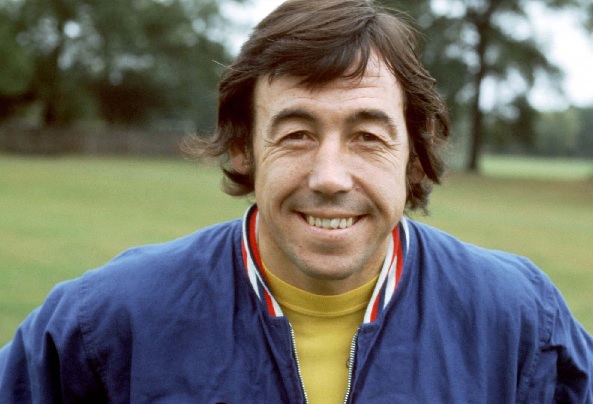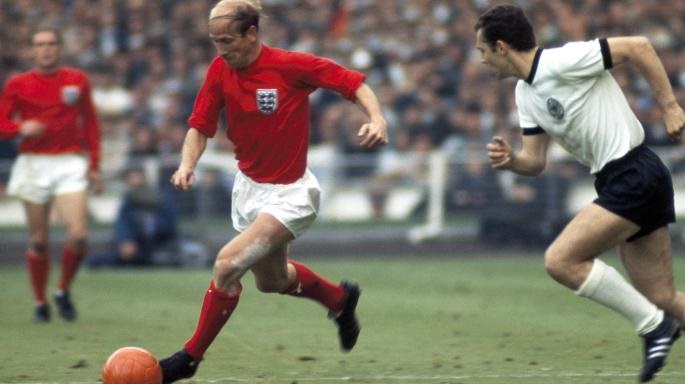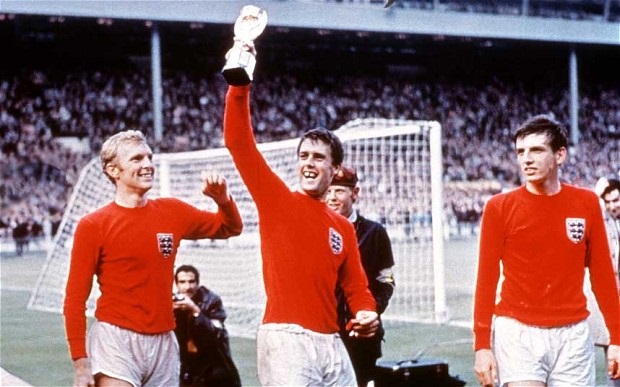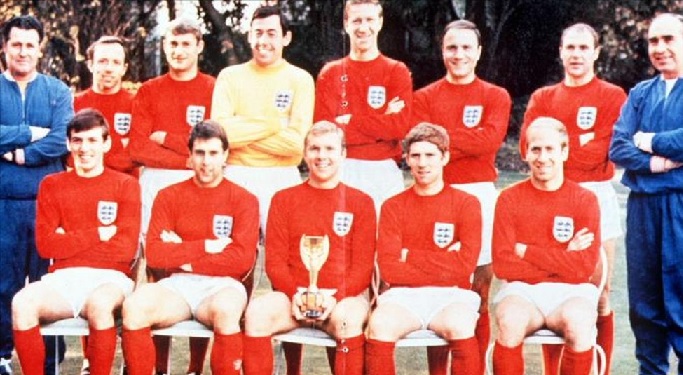Home ⇒ Articles
As we approached Valentine`s Day 2019 the world said goodbye to another much loved football icon, Gordon Banks who died, aged 81, after a long illness. Gordon was the fourth of the fabled Magnificent XI, who etched their names forever in football folklore as England World Cup Winners in 1966 to pass away.
Alan Ball, Bobby Moore and Ray Wilson preceded Gordon as time took its toll on stars who were regarded as immortal but were after all just unique human beings. Ironically and adding further poignancy to Gordon`s passing was the news that broke shortly after his death that he was in line to receive a knighthood but, incredibly, the paperwork was lost in government officialdom, after the process was started TWO YEARS EARLIER.
So England`s greatest ever goalkeeper was, and will forever be prevented, from becoming the third World Cup winning knight because knighthoods cannot be awarded posthumously.
The human beings label is important and like many of my generation there seemed to be a connection between the boys of `66 and the millions of us fans who bit nails down to the quick and covered heads in cushions on a daily basis almost as England ploughed through the World Cup on home soil. For me the industry I eventually worked in allowed a unique and extra special connection to those red-shirted stars who visibly lifted the entire nation in that glorious summer of 1966.

I met and interviewed all of the Magnificent XI, with the exception of Ray Wilson who always seemed to elude me but Gordon Banks has a special place in my life as he was the first ever interview I carried out as a journalist. It was back in the early 1980s when I took my place in the press box at the Victoria Ground and just in front of the press seats were the posh seats. In one of those posh seats sat the legend that was Gordon Banks. I asked Gordon if he would do a brief interview with me. He was politeness personified as he granted my request. He was Gordon Banks after all, why not start at the top.
I was to interview Gordon many times over the years and got to know some of the myriad tit bits of information that punctuated his life and career that were rarely, if ever, made public. He told me that were it not for a missed bus that stopped him attending a Football League match in his native Sheffield he might never have gone into football. Instead of the terraces that day he missed the bus Gordon, badly in need of his regular footie fix, made his way to a local park where he leaned on a fence to watch a local match. He was approached by someone who remembered seeing Gordon play in goal and asked if he fancied a game because `our regular goalkeeper has let us down`. Gordon raced home to get his kit but in his haste he forgot his shorts but undaunted he took his place between the sticks, in his work trousers. And the rest is history.
Of course the news surrounding Gordon`s passing was heavily illustrated with `that save` and isn`t it amazing that those two simple words, in the millions of saves the football world sees, conjures up that magic moment from Mexico 1970.
But here`s something that is not widely known. When I spoke to Gordon about that save he told me.
“If you look carefully at the film of that save you can see how I flexed my wrist to get my fist under the ball so I could bat it over the bar”.
I did so immediately and yes, not only does Gordon make ground from his near post to get to the bounce of Pele`s header he does indeed have the time and quickness of reflexes, to cock his wrist back and then upwards to deny the best player in the world a headed goal.
Next time you get chance look at that save with a fresh eye. It was brilliant enough in the first place but in doing what Gordon describes, with his wrist, it makes it the save that everyone regards as the best ever. RIP Gordon.
Bobby Moore was the first of the Class of `66 to pass away, in 1993 at the early age of 51, indeed it is very soon the 26th anniversary of his death. Much was been written about the man who lifted the Jules Rimet Trophy in 1966 but I think the moment that sums up the man, for me anyway, isn`t his impeccable reading of the game or his stoic defending which barely caused him to raise a sweat it was the moment, just before he was handed the World Cup by the Queen. Bobby Moore wiped his muddy hands on the velvet cover before he shook hands with Her Majesty. Class or what? CLASS.

Alan Ball was the youngest member of the World Cup winning side at just 21 years of age. He was the personification of perpetual motion and it was a feature of his game that he never lost. But he was also the consummate midfielder. He could tackle and shoot but also pick out a defence splitting pass better than most. He scored nearly 200 club goals as well as eight in his 72 England appearances. After retiring as a player Alan went on to manage eight clubs including Southampton, Manchester City and Portsmouth. He died in 2007 attempting to extinguish a garden bonfire that went out of control and, in keeping with the character that was integral to his football, he attacked the out of control flames with a passion and determination that was to cost him his life.
Ray Wilson, who died just last year, was at 34 the oldest member of England`s World Cup winning team. He began his career at Huddersfield Town, in tandem with working on the railways at night, where legendary manager Bill Shankly converted him from a wing half to full back. His glittering club career saw him leave Huddersfield for Everton and then Oldham before ending his playing days at Bradford in 1971. He started and ran a very successful undertakers business in Halifax until 1997. By then Ray had already been diagnosed with dementia, aged 69, and after a 14 year battle against Alzheimers he passed away in May 2018.
Alzheimers is a cross already borne by two other members of the Class of `66, Martin Peters, and Nobby Stiles. Martin, who was a West Ham World Cup winner, along with the rest of the Hammers` triumverate, Bobby Moore and Geoff Hurst, went on to join Tottenham Hotspur, as Britain`s first £200,000 footballer, where he was lumbered with the epithet of being `10 years ahead of his time` by Sir Alf Ramsey because of his almost telepathic reading of the game. A much better and appropriate nickname was `The Ghost` for the way he would ghost in at the far post to score many a goal. One of only two Englishmen to score in a World Cup Final, he got one of England`s goals against West Germany, Martin retired in 1981 and went to work in insurance.
Martin was unable to attend the 50th anniversary celebration of the 1966 World Cup win because he was struggling with Alzheimers and, ironically, team mates Sir Geoff Hurst and Gordon Banks have been leading a campaign to raise awareness of and funds for Alzheimers research because of its` affect on Martin and Nobby Stiles.
Nobby, born Norbet, but no one ever dared call him that, Stiles was the goofy celebrant who danced around Wembley with the Jules Rimet Trophy in July 1966 and endeared himself to the world. His man-marking job on Eusebio in the closely fought World Cup semi-final with Portugal was the definitive master class in man-marking and was instrumental in England winning the game. But Nobby was more than a combative midfielder, you don`t spend 11 years as a Manchester United player under Matt Busby if you can`t play. Nobby did and could. He won the FA Cup, League Championship and European Cup, with United before ending his career with two years at Middlesbrough and two at Preston.
As with Gordon Banks I have a special connection to Nobby. One of the privileges of being a football journalist is the opportunity to meet football legends. I was asked to review Nobby`s autobiography `After the ball` which some unkind folk asserted was the perfect way to sum up some of Nobby`s less than perfectly timed tackles. I also interviewed him at the National Football Museum when they were displaying that Jules Rimet Trophy Nobby danced with back in 1966.
I have some very precious photos of Nobby explaining to me, and showing me, how his responsibility in that game against West Germany was to organise the wall against the very late free-kick from which the Germans scored to make it 2-2 and send the game into extra-time. So as Nobby and I were there at the NFM and the photographer was snapping away Nobby was pulling me, arms linked, this way and that in the same way he pulled the England wall that day at Wembley. West Germany`s goal resulted from the ball coming back off the wall,
“So it wasn`t my fault, said Nobby, the wall did its job and I did mine.”
I wasn`t about to argue.
George Cohen was England`s right back in 1966 and was a one-club man spending all his career amassing 459 appearances for Fulham. With Cohen on the right and Ray Wilson on the left they gave `wings` to Alf Ramsey`s `wingless wonders` and established the phenomenon of attacking full backs into the English game. George had to retire aged just 29 through injury but what a legacy. George Best described him as `the best full back I ever played against` and Alf Ramsey called George ` England`s best ever right back`. George will be 80 this year and still goes to Craven Cottage where a statute of him was unveiled in 2016 to mark the 50th anniversary of the 1966 World Cup win.
Jack Charlton, the gangly, uncompromising centre half at the heart of England`s World Cup winners, was another one-club man in that side. He spent his entire career at Leeds United but didn’t make his England debut until days before celebrating his 30th birthday. He had a medal laden career at Leeds and when he went into management he achieved similar success. In the first year of his managerial career he led Middlesbrough to the Second Division title and landed himself the Manager of the Year award. He then left to manage Sheffield Wednesday and had one season in charge at Newcastle United before becoming manager of the Republic of Ireland who he steered to their first ever World Cup, Italia 1990 when they reached the quarter-finals. His success with Ireland saw them qualify for the 1988 Euros and the 1994 World Cup. Jack, usually called `Jackie`, now 83, retired in 1996 to enjoy life fishing and shooting which he did with the same passion he applied to wiping out opposing players.
Jack’s brother Bobby was one of the three unquestionably World Class players in that 1966 World Cup winning side, along with Banks and Moore. Bobby was the artist to his brother`s artisan. While Jack invented the art of centre halves going up for corners and heading vital goals, Bobby scored goals for fun, usually 30 yard blockbusters, such as the one that opened England`s scoring in 1966, against Mexico. He was Manchester United all-time leading goal scorer with 249 until eclipsed by Wayne Rooney in 2017. He was also England`s leading marksman until the same Wayne Rooney went past Bobby’s 49, a year before he snatched Charlton’s United record.

Bobby Charlton is widely regarded as one of the very best players of all time and spent a glittering 17 year career at Old Trafford, making his United debut aged 19 against, Charlton Athletic, in 1957. He left United to manage Preston North End, in 1973-74 and the following year he pulled on his boots again to become player manager at Deepdale. Eventually Bobby joined the Board of Directors at United, in 1984, and still attends games all over the country, aged 81.
Roger Hunt was Geoff Hurst`s strike partner in 1966 and played in all six World Cup games, scoring three goals. Totally appropriate since he managed a striker rate of a goal every two games throughout his career finishing with 285 goals in 492 games, well ahead of the accepted rate of one in two that top strikers aspire to but few manage. He bettered that strike rate at international level with 18 goals in 34.
Roger spent 11 years with Liverpool before ending his career at Bolton Wanderers in 1972 although he did have a spell with Hellenic in South Africa, scoring four goals in six loan appearances. On his retirement Roger joined the family haulage business but is more well known as a member of the Pools Panel that sit whenever bad weather affects the football programme. Still lives in Warrington.

Geoff Hurst is still the only footballer to score a World Cup Final hat-trick. Still sprightly at 77 Geoff is still active in the world of football and is often seen at football functions all over the world. As well as his illustrious football career what isn`t widely known is that Geoff also played first class County cricket, playing two innings for Essex, in 1962, before concentrating on his football career.
I had the pleasure of interviewing Geoff, sorry, Sir Geoff, and he was at pains to point out that despite being down in some record books as recording a `Golden Pair`, out for nought in both innings of his one Essex appearance, he was actually;
“Nought, and nought, NOT OUT.”
I wasn`t about to argue with a knight of the realm.
Geoff retired from playing in 1976 and after a brief career in management, the high point being his two years as Chelsea manager between 1979 and 1981, he went into the insurance trade. He now lives in Cheltenham with his wife of 55 years, Judith.
Football will never forget the CLASS of 1966, nor should they be forgotten. Even if, or when, another England team scales the heights to the pantheon of World Cup winners;
Banks, Cohen, Charlton, Moore, Wilson, Stiles, Ball, Peters, Charlton, Hunt and Hurst.
THE MAGNIFICENT XI

Written by Brian Beard
